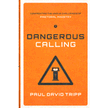
“When my conscience is activated and bothered, I am faced with making one of two choices. The first and best choice is to admit that what I have done is wrong and place myself once again under the justifying mercies of Christ, receiving his forgiveness. Or I can erect some system of self-atonement that essentially argues for the rightness of what I’ve done. What I am doing here is making myself feel good about what God says is not good. I am participating in my own spiritual blindness. Every person still living with sin inside is a very skilled self-swindler… We do this way more often than we are aware” (Paul David Tripp in Dangerous Calling, pages 70-71, italics mine).
One truth that has been emphasized for the ministry worker is that though he or she may teach, lead, counsel, or shepherd other people, he or she will still struggle with sin. Previous blogs have pointed out the importance of nurturing personal time with God, as well as the importance of community. This blog will speak to sin. If I were to ask the question, “Do you struggle with sin?” What would you say? Hopefully, for all of us, the answer would be “Yes.” If I were to ask the question, “What do you do when [after] you sin?”, what would your answer be? Tripp notes there are two choices: admitting the sin and placing oneself under the “justifying mercies of Christ” or “erecting some system of self-atonement.”
In the counseling office when dealing with abuse, themes that are beneficial for discussion may include patterns of control and manipulation. For example, if a husband is abusing his wife, it is important for the husband and the counselor to identify and discuss themes of control and manipulation. Elements of change include the recognition of the husband’s own sin and an acknowledgement of his wrong-doing. Change occurs when an abusing husband calls his sin for what it is. He does not minimize, deny, or blame-shift (e.g. “If my wife didn’t __________, I wouldn’t become angry.”).
You and I are faced with this same decision each time we sin. Though we may not struggle with abusing another individual, there may be struggles of self-righteousness, selfishness, greed, gossip, lying, or envy. Like the husband that abuses his wife, we may be tempted to minimize our sin, deny our actions, or blame-shift it onto someone else. When we do these things, we are, as Tripp says, “erecting some system of self-atonement.” Instead of acknowledging we gossiped, we minimize by saying it was just a “prayer request.” Instead of owning anger, a pastor who has become angry at a committee meeting may justify it, convincing himself that he was speaking as one of God’s prophets would: “Thus says the Lord.” Tripp rightly notes that when we do these things, we “make ourselves feel good about what is in no way good” (p. 71). In other words, we become self-swindlers.
The answer to the question, “Do you struggle with sin?” should be yes. I know mine is. The question after that one is important. There are two choices: Do you admit that sin and place yourself under the mercies of Christ’s forgiveness, or are you a self-swindler—creating some form of self-atonement, arguing for the rightness of what you have done?
 |
Dangerous Calling: Confronting the Unique Challenges of Pastoral Ministry By Paul David Tripp / Crossway Books & Bibles |